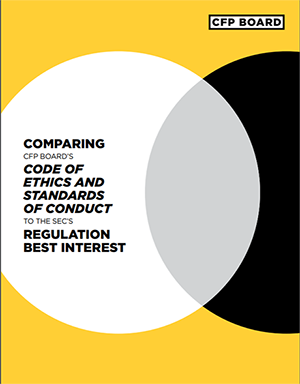What You Need To Know About CFP Board’s "Code & Standards" and Reg BI
Enforcement of the Code of Ethics and Standards of Conduct (Code and Standards) and the SEC’s Regulation Best Interest (Reg BI) began on June 30, 2020.

After years of process, including multiple public comment periods and engagement with stakeholders, both CFP Board and the SEC began the enforcement of their standards governing CFP® professionals, and in the case of the SEC’s Reg BI, representatives of broker-dealers more broadly. Through these advancements, both CFP Board and the SEC are hoping to help investors navigate the increasingly complex (and conflicted) financial services landscape.
If you are a CFP® professional, you’ve probably seen the news coverage and social media discussion of CFP Board’s Code and Standards and the SEC’s Reg BI, and you may wonder what the difference is between the two and how it applies to your job as a financial professional.
To answer this question and to present CFP Board’s perspective on important differences between the Code and Standards and Reg BI, we created a Comparative Guide as part of our comprehensive Compliance Resources Library.
Does Reg BI apply to me?
All CFP® professionals who are registered representatives of broker-dealers are subject to both the Code and Standards and Reg BI, which is why it’s crucial to understand what is expected of you under both rules.
The Standard of Conduct
Arguably, the fundamental distinction between the Code and Standards and Reg BI stems from the foundations that CFP Board and the SEC used to build their standards of conduct. While both impose a “best interest” standard, CFP Board explicitly adopted a fiduciary standard whereas the SEC did not.
The cornerstone of the Code and Standards is its fiduciary duty, which includes a duty of loyalty on CFP® professionals to place the clients’ interest above their own and their firm’s, a duty of care, and a duty to follow client instructions.
This clear standard — along with the entire Code and Standards — is consistent with CFP Board’s mission to benefit the public. Professional bodies, such as CFP Board, exist in part to set standards that go beyond those required by the law, for the benefit of the public and the profession.
The commitment that a CFP® professional makes to CFP Board to act as a fiduciary represents the source of several other differences between the CFP Board Code and Standards and Reg BI:
- Duty of Loyalty: When a CFP® professional gives advice or a recommendation, CFP Board’s Code and Standards explicitly requires the client’s interest to come first and the recommendation to be “without regard” to the interests of anyone but the client. The SEC does not use similar language in Reg BI.
- Duty of Care: The Code and Standards and Reg BI include similar client-specific duties of care. CFP Board requires “prudence” while the SEC says that prudence is covered by other language in Reg BI. Any difference in the duties of care will be revealed when the SEC interprets Reg BI. Notably, the Duty of Care in the Code and Standards uses the “prudent professional” standard, which is a higher standard for fiduciaries than a “reasonable person” standard.
Conflicts of Interest: Mere Disclosure Is Insufficient
Both CFP Board and the SEC state that mere disclosure of conflicts of interest is insufficient to satisfy the Code and Standards and Reg BI, respectively. CFP Board requires a CFP® professional to disclose and obtain informed consent to all conflicts, and then manage them, while the SEC requires a broker-dealer to disclose all conflicts and mitigate representative-level conflicts. The terms “mitigate” and “manage” may be interpreted similarly.
The primary difference is that the Code and Standards provides a standard by which the handling of conflicts of interest can be evaluated: a CFP® professional is required to adopt and follow business practices reasonably designed to prevent conflicts from compromising his or her ability to act in the client’s best interests. The SEC, however, did not explicitly provide a standard for evaluating a broker-dealer’s mitigation efforts. Whether it will do so remains to be seen.
Oral vs. Written Disclosure of Conflict of Interest
Under the Code and Standards, CFP® professionals have the option to disclose Material Conflicts of Interest either orally or in writing. However, Reg BI requires written disclosure of material facts, which means that a CFP® professional who is a registered representative also must comply with this requirement.
A Broader Universe of Coverage
The Code and Standards and Reg BI differ in both the recommendations and the relationships they cover. Recommendations covered by Reg BI are strictly limited to those concerning securities transactions and investment strategies involving securities, whereas the Code and Standards applies to recommendations regarding all financial assets including securities transactions and investment strategies involving securities, as well as insurance products, real estate, derivatives contracts, and others.
Under the Code and Standards, a “client” could refer to a natural person as well as a business organization or entity, whereas Reg BI’s “retail customer” definition applies only to a natural person or his or her legal representative who has received and used a recommendation.
It is expected that the SEC will offer interpretive guidance on Reg BI over time to help financial professionals further understand how the SEC will apply Reg BI. Currently, CFP Board offers its Compliance Resource Library, a growing collection of resources that outline for CFP® professionals how the Code & Standards applies to their practice.

